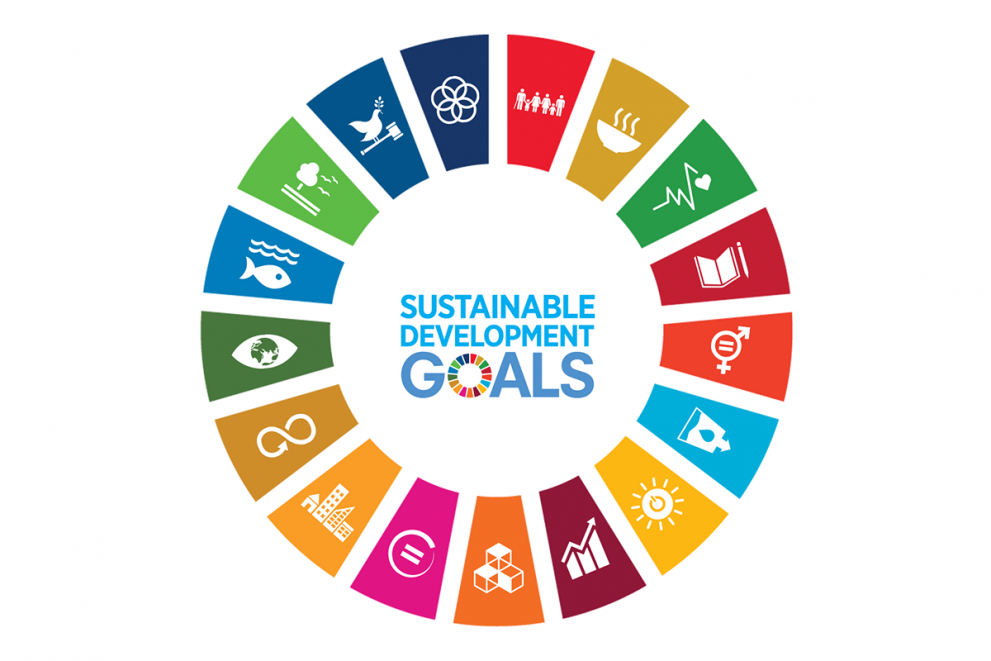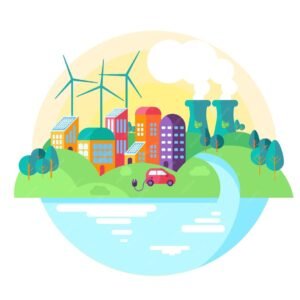In the realm of environmental consciousness, the term “sustainability” reverberates far beyond mere rhetoric. It embodies a multifaceted ethos intertwining environmental stewardship, social equity, and economic viability. Sustainability, in its essence, entails the delicate balancing act of meeting present needs without jeopardizing the ability of future generations to meet their own.
Deciphering Sustainability: An Integrated Approach
Picture a sturdy three-legged stool, each leg symbolizing a fundamental aspect of sustainability:
- Environmental Sustainability: At its core, environmental sustainability champions the preservation of natural resources, the curtailment of pollution, and the mitigation of climate change impacts. It encompasses a spectrum of practices ranging from harnessing renewable energy sources to implementing robust waste management strategies and safeguarding biodiversity.
- Social Sustainability: The pillar of social sustainability underscores the imperative of fostering inclusive societies, wherein every individual has equitable access to basic necessities, education, healthcare, and opportunities for upward mobility. It endeavors to alleviate poverty, promote social cohesion, and champion human rights.
- Economic Sustainability: Anchored on the principle of prudent resource utilization, economic sustainability advocates for long-term prosperity devoid of resource depletion or undue societal costs. It espouses responsible business conduct, resource efficiency, and the cultivation of green economies teeming with sustainable livelihoods.
India’s Tryst with Sustainability
Against the backdrop of a burgeoning population and a dynamic economy, India grapples with the intricate challenge of harmonizing development imperatives with environmental preservation. A panoramic view of India’s sustainability landscape unveils a tapestry woven with both triumphs and tribulations:
- Environmental Challenges: India stands as one of the world’s foremost emitters of greenhouse gases, contending with pervasive air and water pollution alongside the specter of climate change-induced vagaries like erratic rainfall patterns and escalating sea levels. Notably, a Greenpeace report in 2023 underscored that 21 out of the 30 most polluted cities globally are nestled within India’s borders.
- Social Concerns: Despite commendable strides in various spheres, India remains ensnared in the grip of poverty, social disparity, and the lingering specter of inadequate access to basic amenities such as clean water and sanitation facilities. According to the World Bank, a staggering 22% of India’s populace grapples with the harsh realities of living below the national poverty line.
Pioneering Initiatives: Charting India’s Sustainability Odyssey
Amidst the labyrinth of challenges, India embarks on a transformative odyssey towards sustainability, underscored by a melange of pioneering initiatives:
- Renewable Energy Renaissance: Spearheading the global renewable energy revolution, India emerges as a vanguard, boasting an installed solar capacity exceeding 175 gigawatts as of March 2024. Bolstered by ambitious targets and a multifaceted approach encompassing wind, biomass, and hydroelectricity, India marches steadfastly towards assuming the mantle of the world’s preeminent renewable energy consumer by 2025, as per the International Energy Agency’s prognostications.
- Swachh Bharat Mission: Unveiled in 2014, the Swachh Bharat Mission stands as a testament to India’s unwavering commitment to sanitation and hygiene. With the laudable endeavor of eradicating open defecation and ensuring universal access to sanitation facilities, this flagship program has catalyzed the construction of over 110 million toilets, heralding a paradigm shift in India’s sanitation landscape.
- Smart Cities Paradigm: Anchored on the ethos of sustainability, the Smart Cities Mission epitomizes India’s aspirations of fostering urban ecosystems replete with cutting-edge infrastructure, efficient waste management systems, and sustainable modes of transportation. As of 2023, a hundred cities stand poised on the threshold of transformation into veritable hubs of innovation and sustainability.
- National Electric Mobility Mission: Unveiling a greener tomorrow, the National Electric Mobility Mission unfurls a blueprint for curbing vehicular emissions and embracing sustainable transportation alternatives. Pioneering initiatives encompass subsidies for electric vehicle adoption, the establishment of charging infrastructure, and fervent strides in research and development endeavors. India sets its sights on electrifying 30% of its vehicular fleet by 2030, propelling itself towards a cleaner, more sustainable mobility paradigm.
Legislative Imperatives: Navigating the Policy Landscape
Navigating the intricate terrain of policy and legislation, India unveils a tapestry of legislative imperatives aimed at steering the nation towards a sustainable trajectory:
- The Paris Agreement: As a signatory to the Paris Agreement, India articulates its unwavering commitment to combatting climate change by charting a course towards a low-carbon economy. With ambitious targets delineated to slash carbon emissions by 30-35% from 2005 levels by 2030, India emerges as a beacon of climate resilience and environmental stewardship.
- National Green Tribunal (NGT): Enshrined as a bastion of environmental justice, the National Green Tribunal assumes a pivotal role in enforcing environmental edicts and safeguarding ecological sanctity. Since its inception in 2010, the NGT has wielded its quasi-judicial authority to crack down on polluting industries and fortify the bulwarks of environmental conservation.
- The Energy Conservation Act: Mandating a paradigm shift towards energy efficiency, the Energy Conservation Act heralds a new epoch characterized by judicious resource utilization and reduced carbon footprints across diverse sectors. Galvanized by the imperatives of sustainability, India charts a trajectory marked by diminished energy consumption and heightened environmental stewardship.
Cultivating Sustainable Agriculture: A Prerequisite for Food Security
Against the backdrop of agrarian abundance, sustainable agriculture emerges as a linchpin in India’s quest for food security and environmental resilience. Endeavors to bolster sustainable agricultural practices encompass a gamut of interventions:
- Organic Farming Advocacy: Embracing the ethos of organic farming, India heralds a paradigm shift towards sustainable agricultural practices rooted in soil conservation, biodiversity preservation, and chemical-free cultivation techniques. Initiatives like the Paramparagat Krishi Yojana exemplify India’s unwavering commitment to fostering agrarian sustainability.
Navigating Challenges: Paving the Path Ahead
Yet, amidst the panorama of progress, formidable challenges loom large on India’s sustainability horizon:
- Financial Imperatives: Navigating the labyrinth of sustainable transitions necessitates substantial financial investments spanning renewable energy infrastructure, clean technologies, and green infrastructure projects. Public-private partnerships and innovative financing mechanisms emerge as linchpins in bridging the yawning chasm of financial exigencies.
- Capacity Building Imperatives: The transition towards a green economy mandates a skilled workforce equipped with proficiencies in renewable energy technologies, waste management protocols, and sustainable agricultural practices. Investment in comprehensive skill development initiatives emerges as a sine qua non for nurturing a cadre of sustainability champions poised to usher India into a greener tomorrow.
- Socioeconomic Equity: In the pursuit of sustainability, fostering socioeconomic equity assumes paramount importance. Policies must transcend conventional paradigms to address the scourge of poverty, inequitable access to resources, and entrenched social disparities, thereby engendering a more inclusive and just society.
- Cultural Shifts and Public Awareness: At the heart of sustainability lies a transformative cultural zeitgeist underpinned by shifts in public behavior and consciousness. Public awareness campaigns, educational endeavors, and community mobilization initiatives stand poised as potent catalysts in instigating a groundswell of support for sustainable practices encompassing resource conservation, responsible consumption, and waste minimization.
Harnessing the Power of Collective Action
India’s odyssey towards sustainability unfolds as a collective endeavor, wherein every stakeholder assumes a pivotal role in shaping a greener tomorrow:
- Government Leadership: At the vanguard of sustainability, the government steers the ship of progress through the formulation of robust policies, the provision of incentives for sustainable endeavors, and strategic investments in green infrastructure. By championing legislative imperatives and fostering an enabling environment, the government lays the groundwork for India’s sustainable transformation.
- Corporate Stewardship: Businesses wield immense influence in catalyzing sustainability transitions across diverse sectors. Embracing the principles of corporate social responsibility, businesses pivot towards sustainable practices spanning renewable energy adoption, waste reduction, and eco-friendly product innovation. By integrating sustainability into their DNA, corporations emerge as harbingers of change, driving India towards a more sustainable economic paradigm.
- Community Engagement: Communities serve as the bedrock of sustainability, wherein collective action begets transformative change. From grassroots movements advocating for environmental conservation to localized initiatives promoting sustainable living practices, communities emerge as crucibles of innovation and resilience. By fostering community cohesion and collective agency, India inches closer towards realizing its sustainability aspirations.
- Individual Empowerment: At the nexus of sustainability lies the power of individual agency, wherein everyday choices culminate in profound societal impacts. By embracing energy-efficient appliances, reducing waste generation, and patronizing eco-conscious businesses, individuals become agents of change, steering India towards a greener trajectory. Empowered by knowledge and fueled by conviction, individuals serve as catalysts for societal transformation, imbuing India’s sustainability narrative with renewed vigor and purpose.
Embracing a Sustainable Future
In the crucible of India’s sustainability odyssey, the journey is as consequential as the destination. By weaving a tapestry of environmental stewardship, social equity, and economic prosperity, India forges a path towards a future defined by resilience and renewal. As the nation navigates the labyrinth of challenges and triumphs, it stands poised on the cusp of a transformative epoch, wherein sustainability transcends rhetoric to become an indelible hallmark of national identity.
In this vein, the imperative of solar panel cleaning emerges as a quintessential facet of India’s sustainability narrative. As the sun-drenched landscapes of India teem with untapped solar potential, the efficacy of solar panel cleaning assumes paramount importance in maximizing energy yields and optimizing operational efficiency. Leveraging cutting-edge technologies, such as autonomous waterless AI-enabled microfiber cloth-based solar panel cleaning robots, India stands at the vanguard of solar innovation.
In this regard, Taypro India emerges as a beacon of technological prowess, spearheading the charge towards sustainable solar energy utilization. Through its pioneering endeavors in solar panel cleaning automation, Taypro India empowers India to harness the boundless energy potential of the sun while minimizing environmental impact. As a testament to its commitment to sustainability, Taypro India offers state-of-the-art solar panel cleaning solutions tailored to India’s unique environmental landscape.
To embark on a sustainable future powered by solar innovation, explore Taypro India’s comprehensive suite of services at Taypro India. Together, let us usher in a future where sustainability reigns supreme, and India emerges as a beacon of environmental stewardship for generations to come.





